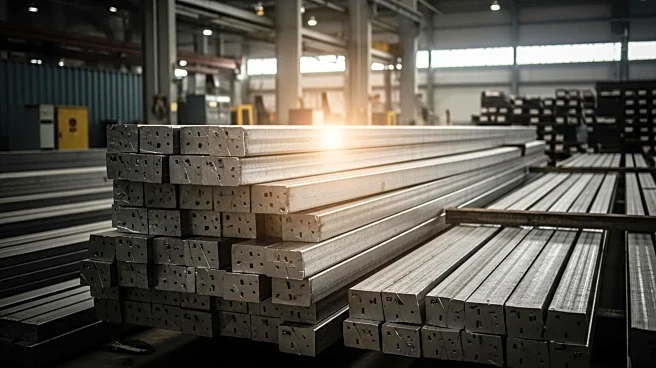What is the story about?
What's Happening?
Baoshan Iron & Steel Co, known as Baosteel, anticipates China's steel exports to exceed 100 million metric tons in 2025. This projection comes despite potential curbs on national steel output due to overcapacity issues. Baosteel, a subsidiary of China Baowu Steel Group, the world's largest steelmaker by output, reported a significant increase in steel exports in the first seven months of the year, climbing 11.4% to a record high. The company exported 4.83 million tons of steel during this period. Baosteel plans to expand its export capacity to 15 million tons by 2026 and 20 million tons by 2028. The company is also monitoring measures to reduce steel output and the development of 'anti-involution' policies aimed at addressing overcapacity in the industry.
Why It's Important?
China's steel industry plays a crucial role in the global market, and its export levels significantly impact international trade dynamics. The anticipated high export levels could lead to increased competition and potential trade tensions, especially with countries imposing tariff barriers and new tax regulations. Overcapacity in China's steel sector has previously led to price wars and protectionist measures worldwide. Baosteel's strategy to monitor and potentially curb output reflects efforts to stabilize the market and address these challenges. The company's expansion plans indicate a continued focus on maintaining its competitive edge in the global steel industry.
What's Next?
Baosteel's future actions will likely focus on balancing export growth with domestic and international market demands. The company will need to navigate potential regulatory changes and trade barriers that could affect its export strategy. Additionally, China's broader economic policies, including supply reforms and anti-involution measures, will influence Baosteel's operations and the steel industry's trajectory. Stakeholders, including international trade partners and domestic policymakers, will closely watch these developments to assess their impact on global steel trade and economic relations.
Beyond the Headlines
The issue of overcapacity in China's steel industry highlights broader economic challenges, including deflationary pressures and the need for structural reforms. Baosteel's approach to managing these challenges reflects a strategic effort to align with national economic goals while maintaining its global market position. The development of 'anti-involution' policies suggests a focus on sustainable industry practices and long-term economic stability, which could have implications for other sectors facing similar overcapacity issues.















